|
|
|
Sort Order |
|
|
|
Items / Page
|
|
|
|
|
|
|
| Srl | Item |
| 1 |
ID:
098379
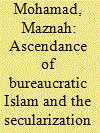

|
|
|
|
|
| Publication |
2010.
|
| Summary/Abstract |
Malaysia's trend of mounting religiosity should not be seen as merely stemming from political rivalry between its two biggest Muslim parties (UMNO and PAS) but also from another source, its Sharia-aspiring bureaucracy. The hegemony of this religious bureaucracy is based on its power as arbiter of the "right" or official Islam and its oversight over Sharia laws and Islamic public institutions. Insulated from voters' displeasure and, to a large extent through its strategy of invoking the immutability of Sharia, this bureaucracy has emerged as the lynchpin of Malaysia's state-driven Islamization. But even as Sharia proponents disavow secularism, the essence of Islamic legal and bureaucratic transformation is closer to a secularized adaptation than to a process of desecularization. Furthermore, as much as the bureaucracy is seemingly unstoppable, it is far from being fully stabilized as it confronts a dissenting section of the Muslim middle class who are also keen to capture the discursive, but highly fortified legal space of "authentic" Islam occupied by this bureaucracy. Ultimately, what surfaces in Islam's politicization is the contestation between a secularized Sharia bureaucracy and its juridical subjects, rather than a desecularization movement.
|
|
|
|
|
|
|
|
|
|
|
|
|
|
|
|
| 2 |
ID:
181649
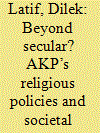

|
|
|
|
|
| Summary/Abstract |
This article addresses the religious policies of Turkey’s Justice and Development Party (AKP) targeted at promoting Islam among the Turkish Cypriot community. For the secular circles of the Turkish Cypriot community, the AKP’s imposed religious policies constitute a threat to its fundamental features and social fabric. Islamisation policies are regarded as cultural imperialism of the AKP government, with the aim of generating a religious youth, a conservative mentality, and more widespread religious practice in North Cyprus. Within this context, this article analyzes the historical account of the secularization experience of the Turkish Cypriot community, the politicization of religion with reference to education, and the penetration of AKP’s religious policies in North Cyprus.
|
|
|
|
|
|
|
|
|
|
|
|
|
|
|
|
| 3 |
ID:
030392
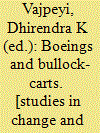

|
|
|
|
|
| Publication |
DelhI, Chanakya Publications, 1990.
|
| Description |
xiv,197p.hbk
|
| Contents |
Vol. II: Indian civilization in its local regional and national aspects
|
| Standard Number |
8170010640
|
|
|
|
|
|
|
|
|
|
|
|
Copies: C:1/I:0,R:0,Q:0
Circulation
| Accession# | Call# | Current Location | Status | Policy | Location |
| 031769 | 954/VAJ 031769 | Main | On Shelf | General | |
|
|
|
|
| 4 |
ID:
125040


|
|
|
|
|
| Publication |
2013.
|
| Summary/Abstract |
Despite its relative absence from much of the literature on politics in the Pacific region, religiosity is an assumed and often unchallenged component of political life. Drawing from more than 100 in-depth biographical interviews with politicians, around 40 published life histories and other publicly available material, this article uses Pierre Bourdieu's concept of 'habitus' to explore how politicians see the role of faith and religious association contributing to their public profile, election campaigning, representative and legislative functions, and 'inner' life. It advances two arguments: firstly, that ideal analytic distinctions like state, society and religion become problematic in the Pacific Islands where political leaders tend to occupy multiple roles and assume overlapping identities; and, secondly, that despite the overwhelming religiosity seemingly apparent in public rhetoric, secularization is an effervescent narrative across the region with politicians vocal protagonists on all sides of this debate.
|
|
|
|
|
|
|
|
|
|
|
|
|
|
|
|
| 5 |
ID:
122800
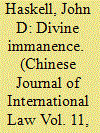

|
|
|
|
|
| Publication |
2012.
|
| Summary/Abstract |
In this article, I hypothesize that against mainstream secularization accounts concerning the 19th-century development of modern international law, especially within the Anglo-American experience, the discipline was significantly influenced by liberal Protestantism. My argument is that a liberal Protestant cultural elite, to which the first generation of international jurists belonged, drew inspiration from the theological doctrine of divine immanence to solidify their socio-political authority against a diverse series of internal and external threats. In an attempt to demonstrate the evangelical foundations of modern international law and the importance played by Anglo-American legal scholars within the tradition, the article is organized into three sections. First, I examine traditional 19th-century narratives of international law, particularly in relation to Christianity. Second, I trace out how the doctrine of divine immanence was formulated in Liberal Protestant theology and how this influenced international legal scholarship within the period in relation to doctrines of the nation-state. Third, I examine how divine immanence shaped three anxieties shared by liberal Protestant theologians and international jurists, including former colonized people and institutions, Roman Catholic beliefs and immigrant populations, and the nascent industrial working-class and radical political ideologies. The article concludes with some brief reflections on the implications of this study and potential directions for future research in the field of religion and international legal history.
|
|
|
|
|
|
|
|
|
|
|
|
|
|
|
|
| 6 |
ID:
062432
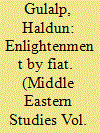

|
|
|
| 7 |
ID:
170103
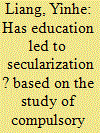

|
|
|
|
|
| Summary/Abstract |
Has education led to secularization? Using microdata from the Chinese General Social Survey (CGSS), we take the implementation of the Compulsory Education Law (CEL) in 1986 in China as the instrumental variables (IV) for personal educational attainment. We study the causal effect of education on personal religious beliefs and explore the potential mechanisms. The empirical results show that education can lead to secularization. More precisely, individual religious belief decreases by 1.5% with one additional year of personal education. In addition, the increase in regional urbanization significantly affects religious beliefs by replacing the insurance function of religion and reducing information acquisition costs. Moreover, there is an alternative relationship between religious activities and social activities, and women affected by the CEL experience a higher negative impact on religious beliefs than men.
|
|
|
|
|
|
|
|
|
|
|
|
|
|
|
|
| 8 |
ID:
125025


|
|
|
|
|
| Publication |
2013.
|
| Summary/Abstract |
The second half of the twentieth century witnessed the rise of what might arguably be described as political religion, with faith traditions everywhere experiencing parallels to the rise of Hindutva in India or the 'muscular' and virulently anti-minority political Buddhism of Sri Lanka and Myanmar. Similarly, Israel, a country founded by cosmopolitan, social-democratic nineteenth century perceptions of Jewish 'national' identity, is increasingly struggling with its ostensibly secular founding ethos. Religiously conservative political parties and attitudes have become mainstreamed in Israel's political landscape in the last couple of decades.1 What might help account for these seemingly similar developments, all of which appear to contradict the basic dictum of secularization theory, namely that increasingly prosperous, urban and industrialized societies will relegate religion and religious practices to the private sphere of a personal 'faith'? Until recently, the assumption persisted that the historical experience of Western Europe, the first part of the world to undergo industrialization and the wider sociocultural effects associated with the process of 'secularization', would be replicated as other parts of the world modernized. An important debate has ensued over the past 20 years or so, involving scholars representing a wide range of disciplinary backgrounds over what appears to be the revitalization of religion and even possibly processes of de-secularization.
|
|
|
|
|
|
|
|
|
|
|
|
|
|
|
|
| 9 |
ID:
119472
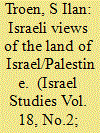

|
|
|
|
|
| Publication |
2013.
|
| Summary/Abstract |
T he J ewish claim to the L and of I srael (E retz I srael) is a very large topic with a historical pedigree thousands of years old. These claims were long rooted in a Jewish peoplehood as defined in a religious culture until the growing secularization of Jews during the 19th century shifted claims from an exclusively religious basis to one that incorporated increasing reliance on secular concepts, particularly nationalism with its demand for a polity. This was just as well since in the contemporary world, religiously-based claims are viewed as parochial. Secular claims are more generally considered universal and therefore appropriate for public debate. In other words, claims rooted in a religious tradition may be effective when directed to fellow-believers; claims expressed in secular terms are more acceptable in extra-communal discourse. Thus, claims to Eretz Israel or Palestine that rely solely on the Covenant between God and the Jews or on the status of Palestine as a Waqf may persuade Jews and Muslims respectively, but have lesser effect when brought to courts of public opinion and the academy.
|
|
|
|
|
|
|
|
|
|
|
|
|
|
|
|
| 10 |
ID:
108018


|
|
|
|
|
| Publication |
2011.
|
| Summary/Abstract |
The principles of liberal political theory are often said to be "freestanding." Are they indeed sufficiently detached from the cultural setting where they emerged to be intelligible to people with other backgrounds? To answer this question, this essay examines the Indian secularism debate and develops a hypothesis on the process whereby liberal principles crystallized in the West and spread elsewhere. It argues that the secularization of western political thought has not produced independent rational principles, but transformed theological ideas into the "topoi" of a culture. Like all topoi, the principles of liberalism depend on other clusters of ideas present in western societies. When they migrate to new settings, the absence of these surrounding ideas presents fundamental obstacles to the interpretation and elaboration of liberal principles. The case of Indian secularism illustrates the cultural limitations of liberal political theory rather than showing its universal significance.
|
|
|
|
|
|
|
|
|
|
|
|
|
|
|
|
| 11 |
ID:
089334
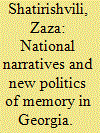

|
|
|
|
|
| Publication |
2009.
|
| Summary/Abstract |
This paper examines three dominant forms of national narratives concerning the fate of the Georgian nation: the old or classical narrative concerning the salvation and rescue of the Georgian nation despite imperial aggression; the narrative of the 'Rose Revolution' telling of the birth of a new nation; and a third narrative of the Georgian Christian Orthodox Church. The first narrative was favored by the old socialist intellectuals and has been eclipsed by the second narrative favored by 'new intellectuals'. Likewise the Orthodox narrative is not anchored on ancient Georgian churches but the new Shrine of the Trinity in Tbilisi. The paper argues that all three narratives embody realms of memory in Georgia and are vital to the understanding of impulses behind Georgian politics. It also suggests that Georgia has not so far undergone a full secularization in the Western sense and has been unable so far to construct new secular realms of memory though the old secular realms associated with the Shevardnadze era have been devalued. The article concludes by briefly discussing the significance of the Georgian intellectual Merab Mamardashvili whose grave in a common cemetery demonstrates the possibility of 'spontaneous' or 'vivid' memory.
|
|
|
|
|
|
|
|
|
|
|
|
|
|
|
|
| 12 |
ID:
052558


|
|
|
| 13 |
ID:
093857


|
|
|
| 14 |
ID:
094820
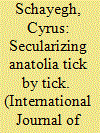

|
|
|
| 15 |
ID:
110832
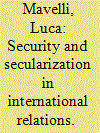

|
|
|
|
|
| Publication |
2012.
|
| Summary/Abstract |
What is the relationship between security and secularization in International Relations? The widespread acceptance of secularism as the paradigmatic framework that underlies the study of world politics has left this question largely unexplored. Yet, the recent challenges to the secularization thesis and the growing attention that is being devoted to questions of religion and secularism in international politics increasingly suggest the importance of undertaking this investigation. This article takes up this task in three main steps. First, it will explore how the limits of a widely accepted but nonetheless problematic account of the emergence of the modern Westphalian nation-state contribute to a dominant underlying assumption in security studies that implicitly associates security with secularization. Second, it will articulate a competing genealogy of security and secularization which suggests that rather than solving the problem of religious insecurity, secularization makes the question of fear and the politics of exceptionalism central to the state-centric project of modernity and its related vision of security. Finally, the article will examine how these elements inform and, most of all, constrain attempts to move beyond the traditional state-centric framework of security. The focus will be on three such attempts: human security, the securitization theory and Ken Booth's critical theory of security.
|
|
|
|
|
|
|
|
|
|
|
|
|
|
|
|
| 16 |
ID:
180021
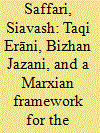

|
|
|
|
|
| Summary/Abstract |
This article examines the development of a Marxian frame for the critique of religion in twentieth century Iranian political thought by Taqi Erāni and Bizhan Jazani. It argues that, following Marx, Erāni and Jazani understand religion to be a superstructural relic from an earlier stage of human development which will gradually and inevitably withdraw from collective human life as a consequence of the material dialectics of history. It further shows that Erāni and Jazani consider religion to be instrumental in sustaining relations of oppression, and they view with skepticism attempts to reform religion or to use religious faith as an instrument for mass mobilization in revolutionary struggles.
|
|
|
|
|
|
|
|
|
|
|
|
|
|
|
|
|
|
|
|
|